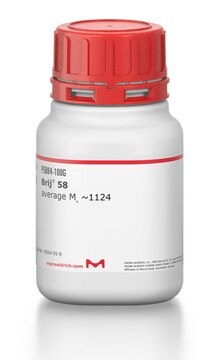1.01894
Brij® 35 solution
(30% w/w in water) for biochemistry
Sinónimos:
Polyoxyethylene (23) Lauryl Ether, Polyoxyethylene lauryl ether, Polyoxyethyleneglycol Dodecyl Ether
Iniciar sesiónpara Ver la Fijación de precios por contrato y de la organización
About This Item
UNSPSC Code:
12352401
NACRES:
NA.21
Productos recomendados
General description
Brij® 35 is a common nonionic surfactant, which has a dodecyl apolar core and a polyoxyethylene chain-formed polar surface. It comprises several hydrophobic and hydrogen-bonding interaction sites with target analytes. Brij 35 is edible and non-toxic.
Application
Brij® 35 solution has been used to develop a novel hexafluoroisopropanol (HFIP)/Brij-35 supramolecular solvent (SUPRAS)-based liquid-phase microextraction (LPME) of parabens. It has also been used to study the formation of water-in-ionic liquid (w/IL) microemulsions in IL 1-butyl-3-methylimidazolium hexafluorophosphate ([bmim][PF6]).
Biochem/physiol Actions
Brij® 35 is known as the “green” modifier in micellar liquid chromatography due to its capability to simulate the biopartitioning process. It forms water-in-ionic liquid (w/IL) microemulsions with IL 1-butyl-3-methylimidazolium hexafluorophosphate ([bmim][PF6]) in the bulk phase. It can also form reverse micelle-type aggregates inside [bmim][PF6] in the absence of added water.
Analysis Note
Identity (IR-spectrum): conforms
Turbidity: ≤ 2.0 NTU
(equivalent to turbidityclass I according to DAB)
Turbidity: ≤ 2.0 NTU
(equivalent to turbidityclass I according to DAB)
Legal Information
Brij is a registered trademark of Croda International PLC
signalword
Warning
hcodes
Hazard Classifications
Eye Irrit. 2 - Skin Irrit. 2
Storage Class
12 - Non Combustible Liquids
wgk_germany
WGK 2
flash_point_f
Not applicable
flash_point_c
Not applicable
Certificados de análisis (COA)
Busque Certificados de análisis (COA) introduciendo el número de lote del producto. Los números de lote se encuentran en la etiqueta del producto después de las palabras «Lot» o «Batch»
¿Ya tiene este producto?
Encuentre la documentación para los productos que ha comprado recientemente en la Biblioteca de documentos.
Los clientes también vieron
Nuestro equipo de científicos tiene experiencia en todas las áreas de investigación: Ciencias de la vida, Ciencia de los materiales, Síntesis química, Cromatografía, Analítica y muchas otras.
Póngase en contacto con el Servicio técnico








